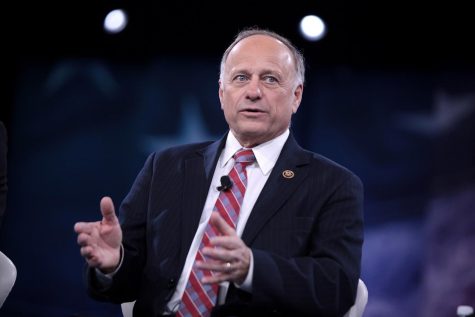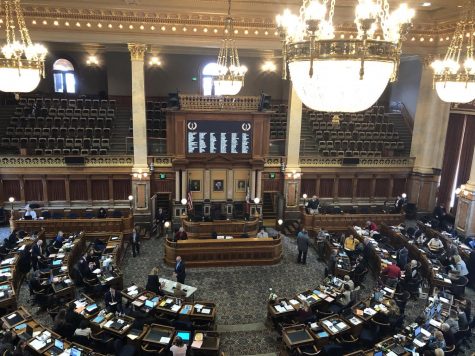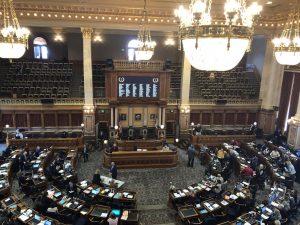Partial U.S. government shutdown impacts Iowa agriculture
The Iowa Secretary of Agriculture said disruptions in partnerships with federal agencies are concerns during the government shutdown.
Iowa Secretary of Agriculture Mike Naig poses for a photo in his office in Des Moines on Jan. 14, 2019.
January 14, 2019
DES MOINES — Iowa Secretary of Agriculture Mike Naig said Monday that the partial government shutdown in Washington, which will enter its 25th day on Tuesday, has had consequences for Iowa farmers.
States are prevented from implementing federal Farm Bill policies and funding, which will add to the uncertainty surrounding funding for conservation programs and food stamps in the new year.
Some farmers who harvested late have also not been able to sign up for the $12 billion federal aid package offered to those impacted by the United States’ ongoing trade dispute with China.
“We have just pushed that uncertainty into 2019 on a variety of fronts, whether it’s [federal aid] payments, or whether it’s needing to see progress on trade,” Naig said. “We are continuing to create uncertainty.”
Naig said operationally, the shutdown has disrupted partnerships and contracts the state has with federal agencies such as the Environmental Protection Agency, Food and Drug Administration, and U.S. Agriculture Department. The state of Iowa has departments that operate on behalf of the federal government, such as food-safety inspections, he said, which are still running through the partial shutdown.
RELATED: Congress passes farm bill, solidifying a 5-year budget for agriculture and food assistance programs
Naig emphasized that Iowa’s partnership with the USDA Conservation Service is essential to the state. He said it has continued to operate during the shutdown, but that the department could potentially run out of money within the next few days if the shutdown continues.
“All of our state employees that work in those USDA offices across the state will then not be able to go into the office, so that really does then impact our conservation programs,” Naig said. “We are of course very hopeful that this shutdown can end and we can get back to business as usual.”
The U.S. government has been in a partial shutdown since Dec. 22, making it the longest in U.S. history, because of President Trump’s dispute with Democratic lawmakers over funding for his proposed U.S.-Mexico border wall. Some federal agencies and programs furloughed workers, and federal staff members that are considered essential continue to work without pay, though Congress could vote to reimburse them later.
Grant Kimberley, director of market development at the Iowa Soybean Association, said the partial government shutdown has had a detrimental impact on short-term cash flow to farmers. Kimberley said there are programs farmers utilize to receive guaranteed loans for items such as grain, which give them flexibility throughout the year.
He said farmers currently not having access to that is creating problems.
“This is four years now in a down market where most people aren’t making much money, if any,” Kimberley said. “To not have that flexibility option is not the best scenario.”
Kimberley said due to late harvests, some farmers had to wait until Jan. 1 to sign up for federal assistance offered in respect to the trade dispute with China. The U.S. has extended the sign-up period by a corresponding number of days after the shutdown ends.
“We talk to a lot of farmers, and a lot of farmers are struggling right now,” Kimberley said. “Everyone is feeling it on one degree or another.”
RELATED: Iowa soybean farmers feeling the heat of tariffs
Sen. Annette Sweeney, R-Buckeye, vice chair of the Iowa Senate Agriculture Committee, said she recognizes that farmers are not benefitting from federal programs they may have signed up for in the fall.
In regards to the federal aid given to farmers in the midst of the trade dispute with China, Sweeney said she believes a portion of that aid has not been able to be disbursed due to the partial shutdown.
“We need to make sure we are looking at ways we can use domestic products to help farmers,” Sweeney said, noting that Iowa’s ethanol programs, or E15, are among some of the products.





















